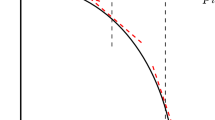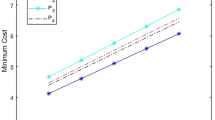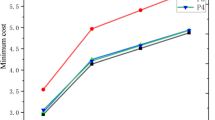Abstract
The robust optimization method has progressively become a research hot spot as a valuable means for dealing with parameter uncertainty in optimization problems. Based on the asymmetric cost consensus model, this paper considers the uncertainties of the experts’ unit adjustment costs under the background of group decision making. At the same time, four uncertain level parameters are introduced. For three types of minimum cost consensus models with direction restrictions, including MCCM-DC,\(\varepsilon \)-MCCM-DC and threshold-based (TB)-MCCM-DC, the robust cost consensus models corresponding to four types of uncertainty sets (Box set, Ellipsoid set, Polyhedron set and Interval-Polyhedron set) are established. Sensitivity analysis is carried out under different parameter conditions to determine the robustness of the solutions obtained from robust optimization models. The robust optimization models are then compared to the minimum cost models for consensus. The example results show that the Interval-Polyhedron set’s robust models have the smallest total costs and strongest robustness. Decision makers can choose the combination of uncertainty sets and uncertain levels according to their risk preferences to minimize the total cost. Finally, in order to reduce the conservatism of the classical robust optimization method, the pricing information of the new product MACUBE 550 is used to build a data-driven robust optimization model. Ellipsoid uncertainty set is proved to better trade-off the average performance and robust performance through different measurement indicators. Therefore, the uncertainty set can be selected according to the needs of the group.





Similar content being viewed by others
References
Ben-Arieh D, Easton T (2007) Multi-criteria group consensus under linear cost opinion elasticity. Decis Support Syst 43(3):713–721
Ben-Arieh D, Easton T, Evans B (2008) Minimum cost consensus with quadratic cost functions. IEEE Trans Syst Man Cybern A Syst Hum 39(1):210–217
Ben-Tal A, Nemirovski A (1998) Robust convex optimization. Math Oper Res 23(4):769–805
Ben-Tal A, Nemirovski A (1999) Robust solutions of uncertain linear programs. Oper Res Lett 25(1):1–13
Ben-Tal A, Nemirovski A (2000) Robust solutions of linear programming problems contaminated with uncertain data. Math Program 88(3):411–424
Bertsimas D, Gupta V, Kallus N (2018) Data-driven robust optimization. Math Program 167(2):235–292
Bolandifar E, Feng TJ, Zhang FQ (2017) Simple contracts to assure supply under noncontractible capacity and asymmetric cost information. Manuf Serv Oper 20(2):217–231
Chassein A, Dokka T, Goerigk M (2019) Algorithms and uncertainty sets for data-driven robust shortest path problems. Eur J Oper Res 274(2):671–686
Cheng D, Zhou ZL, Cheng FX, Zhou YF, Xie YJ (2018) Modeling the minimum cost consensus problem in an asymmetric costs context. Eur J Oper Res 270(3):1122–1137
Conde E (2019) Robust minmax regret combinatorial optimization problems with a resource-dependent uncertainty polyhedron of scenarios. Comput Oper Res 103:97–108
Dong YC, Xu YF, Li HY, Feng B (2010) The OWA-based consensus operator under linguistic representation models using position indexes. Eur J Oper Res 203(2):455–463
Dong YC, Chen X, Herrera F (2015a) Minimizing adjusted simple terms in the consensus reaching process with hesitant linguistic assessments in group decision making. Inf Sci 297:95–117
Dong YC, Luo N, Liang HM (2015b) Consensus building in multiperson decision making with heterogeneous preference representation structures: a perspective based on prospect theory. Appl Soft Comput 35:898–910
Dong YC, Zha QB, Zhang HJ, Kou G, Fujita H, Chiclana F, Herrera-Viedma E (2018a) Consensus reaching in social network group decision making: Research paradigms and challenges. Knowl-Based Syst 162:3–13
Dong YC, Zhan M, Kou G, Ding ZG, Liang HM (2018b) A survey on the fusion process in opinion dynamics. Inf Fusion 43:57–65
Gong ZW, Xu C, Xu XX, Zhang HH, Tang BH (2014) On the consensus modeling with the grey interval preferences. J Grey Syst-UK 26(2):49–60
Gong ZW, Xu XX, Li LS, Xu C (2015a) Consensus modeling with nonlinear utility and cost constraints: a case study. Knowl-Based Syst 88:210–222
Gong ZW, Xu XX, Zhang HH, Ozturk UA, Herrera-Viedma E, Xu C (2015b) The consensus models with interval preference opinions and their economic interpretation. Omega 55:81–90
Gong ZW, Zhang HH, Forrest J, Li LS, Xu XX (2015c) Two consensus models based on the minimum cost and maximum return regarding either all individuals or one individual. Eur J Oper Res 240(1):183–192
Gong ZW, Xu C, Chiclana F, Xu XX (2017) Consensus measure with multi-stage fluctuation utility based on China’s urban demolition negotiation. Group Decis Negot 26(2):379–407
Gong ZW, Zhang N, Chiclana F (2018) The optimization ordering model for intuitionistic fuzzy preference relations with utility functions. Knowl-Based Syst 162:174–184
Greco S, Kadziński M, Mousseau V, Słowiński R (2012) Robust ordinal regression for multiple criteria group decision: Utagms-group and utadisgms-group. Decis Support Syst 52(3):549–561
Han YF, Qu SJ, Wu Z, Huang RP (2019) Robust consensus models based on minimum cost with an application to marketing plan. J Intell Fuzzy Syst. https://doi.org/10.3233/JIFS-190863
Han YF, Qu SJ, Wu Z (2020) Distributionally robust chance constrained optimization model for the minimum cost consensus. Int J Fuzzy Syst. https://doi.org/10.1007/s40815-019-00791-y
Huang RP, Qu SJ, Yang XG, Liu ZM (2019) Multi-stage distributionally robust optimization with risk aversion. J Ind Manag Optim. https://doi.org/10.3934/jimo.2019109
Ji Y, Qu SJ, Wu Z, Liu ZM (2020) A fuzzy robust weighted approach for multi-criteria bilevel games. IEEE Trans Ind Inf 16(8):5369–5376
Kwok PK, Lau HYK (2016) Modified DELPHI-AHP method based on minimum-cost consensus model and vague set theory for road junction control method evaluation criteria selection. J Ind Intell Inf 4(1):76–82
Li Y, Zhang HJ, Dong YC (2017) The interactive consensus reaching process with the minimum and uncertain cost in group decision making. Appl Soft Comput 60:202–212
Liu YJ, Liang CY, Chiclana F, Wu J (2017) A trust induced recommendation mechanism for reaching consensus in group decision making. Knowl-Based Syst 119:221–231
Lu YL, Qu SJ, Xu ZS, Ma G, Li ZW (2020) Multiattribute social network matching with unknown weight and different risk preference. J Intell Fuzzy Syst 1–18
Mahadevan B, Hazra J, Jain T (2017) Services outsourcing under asymmetric cost information. Eur J Oper Res 257(2):456–467
Nag K, Pal T, Mudi RK, Pal NR (2018) Robust multiobjective optimization with robust consensus. IEEE Trans Fuzzy Syst 26(6):3743–3754
Shishebori D, Babadi AY (2015) Robust and reliable medical services network design under uncertain environment and system disruptions. Transp Res E-Log 77:268–288
Soyster AL (1973) Convex programming with set-inclusive constraints and applications to inexact linear programming. Oper Res 21(5):1154–1157
Tan X, Gong ZW, Chiclana F, Zhang N (2018) Consensus modeling with cost chance constraint under uncertainty opinions. Appl Soft Comput 67:721–727
Wu J, Chiclana F (2014) Multiplicative consistency of intuitionistic reciprocal preference relations and its application to missing values estimation and consensus building. Knowl-Based Syst 71:187–200
Wu J, Dai LF, Chiclana F, Fujita H, Herrera-Viedma E (2018) A minimum adjustment cost feedback mechanism based consensus model for group decision making under social network with distributed linguistic trust. Inf Fusion 41:232–242
Wu J, Sun Q, Fujita H, Chiclana F (2019a) An attitudinal consensus degree to control the feedback mechanism in group decision making with different adjustment cost. Knowl-Based Syst 164:265–273
Wu ZB, Huang S, Xu JP (2019b) Multi-stage optimization models for individual consistency and group consensus with preference relations. Eur J Oper Res 275(1):182–194
Xu YJ, Rui D, Wang HM (2017) A dynamically weight adjustment in the consensus reaching process for group decision-making with hesitant fuzzy preference relations. Int J Syst Sci 48(6):1311–1321
Xu YJ, Wen XW, Sun H, Wang HM (2018) Consistency and consensus models with local adjustment strategy for hesitant fuzzy linguistic preference relations. Int J Fuzzy Syst 20(7):2216–2233
Xu YJ, Wen XW, Zhang ZQ (2019) Missing values estimation for incomplete uncertain linguistic preference relations and its application in group decision making. J Intell Fuzzy Syst (Preprint):1–14
Yang DQ, Xiao TJ, Choi TM, Cheng TCE (2018) Optimal reservation pricing strategy for a fashion supply chain with forecast update and asymmetric cost information. Inte J Prod Res 56(5):1960–1981
Zhang BW, Dong YC (2013) Consensus rules with minimum adjustments for multiple attribute group decision making. Proc Comput Sci 17:473–481
Zhang BW, Dong YC, Xu YF (2013) Maximum expert consensus models with linear cost function and aggregation operators. Comput Ind Eng 66(1):147–157
Zhang BW, Dong YC, Xu YF (2014) Multiple attribute consensus rules with minimum adjustments to support consensus reaching. Knowl-Based Syst 67:35–48
Zhang GQ, Dong YC, Xu YF, Li HY (2011) Minimum-cost consensus models under aggregation operators. IEEE Trans Syst Man Cybern A System Hum 41(6):1253–1261
Zhang HJ, Dong YC, Herrera-Viedma E (2017a) Consensus building for the heterogeneous large-scale GDM with the individual concerns and satisfactions. IEEE Trans Fuzzy Syst 26(2):884–898
Zhang N, Gong ZW, Chiclana F (2017b) Minimum cost consensus models based on random opinions. Expert Syst Appl 89:149–159
Zhang ZH, Jiang H (2014) A robust counterpart approach to the bi-objective emergency medical service design problem. Appl Math Model 38(3):1033–1040
Acknowledgements
The work is supported by Natural Scientific Foundation of China (No. 17BGL083). We are very grateful to the editors and referees for their careful reading and constructive suggestions on the manuscript.
Author information
Authors and Affiliations
Corresponding author
Ethics declarations
Conflict of interest
The authors declare that they have no financial and personal relationships with other people or organizations that can inappropriately influence our work, there is no professional or other personal interest of any nature or kind in any product, service and/or company that could be construed as influencing the position presented in, or the review of, the manuscript entitled.
Additional information
Publisher's Note
Springer Nature remains neutral with regard to jurisdictional claims in published maps and institutional affiliations.
Appendix
Appendix
For \(\varepsilon \)-MCCM-DC, i.e., model (2.5), its robust minimum cost consensus problem is:
Then, its corresponding four uncertainty sets are as follows:
-
Interval uncertainty
$$\begin{aligned} \begin{aligned} \min&\quad \sum \limits _{i\in [m]}{(({\hat{c}}_{i}^{U}+\lambda ({\underline{c}}_{i}^{U}-{\hat{c}}_{i}^{U})})\varphi _{i}^{-}+({\hat{c}}_{i}^{D}+\lambda ({\underline{c}}_{i}^{D}-{\hat{c}}_{i}^{D}))\varphi _{i}^{+}) \\ s.t.&\quad {{o}^{c}}\in O \\&\quad {{o}^{c}}+\varphi _{i}^{+}-\varphi _{i}^{-}={{o}_{i}},i\in [m] \\&\quad \varphi _{i}^{+},\varphi _{i}^{-}\ge 0,i\in [m] \\&\quad \varphi _{i}^{+},\varphi _{i}^{-}\le {{\varepsilon }_{i}},i\in [m]. \\ \end{aligned} \end{aligned}$$ -
Ellipsoidal uncertainty
$$\begin{aligned} \begin{aligned} \min&\quad \sum \limits _{i\in [m]}{({\hat{c}}_{i}^{U}}\varphi _{i}^{-}+{\hat{c}}_{i}^{D}\varphi _{i}^{+})+u \\ s.t.&\quad \lambda ({{(\varphi _{i}^{-})}^{T}}\varSigma \varphi _{i}^{-}+{{(\varphi _{i}^{+})}^{T}}\varSigma \varphi _{i}^{+})\le {{u}^{2}},i\in [m] \\&\quad {{o}^{c}}\in O \\&\quad {{o}^{c}}+\varphi _{i}^{+}-\varphi _{i}^{-}={{o}_{i}},i\in [m] \\&\quad \varphi _{i}^{+},\varphi _{i}^{-}\ge 0,i\in [m] \\&\quad \varphi _{i}^{+},\varphi _{i}^{-}\le {{\varepsilon }_{i}},i\in [m]. \\ \end{aligned} \end{aligned}$$ -
Polyhedral uncertainty
$$\begin{aligned} \begin{aligned} \min&\quad u \\ s.t.&\quad \sum \limits _{i\in [m]}{\sum \limits _{j\in [M]}{(c_{ij}^{U}}\varphi _{i}^{-}+c_{ij}^{D}\varphi _{i}^{+})}\le u,i\in [m] \\&\quad {{o}^{c}}\in O \\&\quad {{o}^{c}}+\varphi _{i}^{+}-\varphi _{i}^{-}={{o}_{i}},i\in [m] \\&\quad \varphi _{i}^{+},\varphi _{i}^{-}\ge 0,i\in [m] \\&\quad \varphi _{i}^{+},\varphi _{i}^{-}\le {{\varepsilon }_{i}},i\in [m]. \\ \end{aligned} \end{aligned}$$ -
Interval-Polyhedral uncertainty
$$\begin{aligned} \begin{aligned} \min&\quad \sum \limits _{i\in [m]}{({\hat{c}}_{i}^{U}}\varphi _{i}^{-}+{\hat{c}}_{i}^{D}\varphi _{i}^{+})+\lambda u+{{\left\| v \right\| }_{1}} \\ s.t.&\quad (\bar{c}_{i}^{U}-{\hat{c}}_{i}^{U})\varphi _{i}^{-}+(\bar{c}_{i}^{D}-{\hat{c}}_{i}^{D})\varphi _{i}^{+}\le u+{{v}_{i}},i\in [m] \\&\quad {{o}^{c}}\in O \\&\quad {{o}^{c}}+\varphi _{i}^{+}-\varphi _{i}^{-}={{o}_{i}},i\in [m] \\&\quad \varphi _{i}^{+},\varphi _{i}^{-}\ge 0,i\in [m] \\&\quad \varphi _{i}^{+},\varphi _{i}^{-}\le {{\varepsilon }_{i}},i\in [m]. \\ \end{aligned} \end{aligned}$$
For TB-MCCM-DC, i.e., model (2.8), its robust minimum cost consensus problem is:
Then, its corresponding four uncertainty sets are as follows:
-
Interval uncertainty
$$\begin{aligned} \begin{aligned} \min&\quad \sum \limits _{i\in [m]}{(({\hat{c}}_{i}^{U}+\lambda ({\underline{c}}_{i}^{U}-{\hat{c}}_{i}^{U})})\varphi _{i}^{-}+({\hat{c}}_{i}^{D}+\lambda ({\underline{c}}_{i}^{D}-{\hat{c}}_{i}^{D}))\varphi _{i}^{+}) \\ s.t.&\quad {{o}^{c}}\in O \\&\quad \varphi _{i}^{+}-\varphi _{i}^{-}={{o}_{i}}-{{o}^{c}}+{{\eta }_{i}},i\in [m] \\&\quad \phi _{i}^{+}-\phi _{i}^{-}={{o}_{i}}-{{o}^{c}}-{{\eta }_{i}},i\in [m] \\&\quad \varphi _{i}^{+},\varphi _{i}^{-},\phi _{i}^{+},\phi _{i}^{-}\ge 0,i\in [m].\\ \end{aligned} \end{aligned}$$ -
Ellipsoidal uncertainty
$$\begin{aligned} \begin{aligned} \min&\quad \sum \limits _{i\in [m]}{({\hat{c}}_{i}^{U}}\varphi _{i}^{-}+{\hat{c}}_{i}^{D}\varphi _{i}^{+})+u \\ s.t.&\quad \lambda ({{(\varphi _{i}^{-})}^{T}}\varSigma \varphi _{i}^{-}+{{(\varphi _{i}^{+})}^{T}}\varSigma \varphi _{i}^{+})\le {{u}^{2}},i\in [m] \\&\quad {{o}^{c}}\in O \\&\quad \varphi _{i}^{+}-\varphi _{i}^{-}={{o}_{i}}-{{o}^{c}}+{{\eta }_{i}},i\in [m] \\&\quad \phi _{i}^{+}-\phi _{i}^{-}={{o}_{i}}-{{o}^{c}}-{{\eta }_{i}},i\in [m] \\&\quad \varphi _{i}^{+},\varphi _{i}^{-},\phi _{i}^{+},\phi _{i}^{-}\ge 0,i\in [m]. \\ \end{aligned} \end{aligned}$$ -
Polyhedral uncertainty
$$\begin{aligned} \begin{aligned} \min&\quad u \\ s.t.&\quad \sum \limits _{i\in [m]}{\sum \limits _{j\in [M]}{(c_{ij}^{U}}\varphi _{i}^{-}+c_{ij}^{D}\varphi _{i}^{+})}\le u,i\in [m] \\&\quad {{o}^{c}}\in O \\&\quad \varphi _{i}^{+}-\varphi _{i}^{-}={{o}_{i}}-{{o}^{c}}+{{\eta }_{i}},i\in [m] \\&\quad \phi _{i}^{+}-\phi _{i}^{-}={{o}_{i}}-{{o}^{c}}-{{\eta }_{i}},i\in [m] \\&\quad \varphi _{i}^{+},\varphi _{i}^{-},\phi _{i}^{+},\phi _{i}^{-}\ge 0,i\in [m] .\\ \end{aligned} \end{aligned}$$ -
Interval-Polyhedral uncertainty
$$\begin{aligned} \begin{aligned} \min&\quad \sum \limits _{i\in [m]}{({\hat{c}}_{i}^{U}}\varphi _{i}^{-}+{\hat{c}}_{i}^{D}\varphi _{i}^{+})+\lambda u+{{\left\| v \right\| }_{1}} \\ s.t.&\quad (\bar{c}_{i}^{U}-{\hat{c}}_{i}^{U})\varphi _{i}^{-}+(\bar{c}_{i}^{D}-{\hat{c}}_{i}^{D})\varphi _{i}^{+}\le u+{{v}_{i}},i\in [m] \\&\quad {{o}^{c}}\in O \\&\quad \varphi _{i}^{+}-\varphi _{i}^{-}={{o}_{i}}-{{o}^{c}}+{{\eta }_{i}},i\in [m] \\&\quad \phi _{i}^{+}-\phi _{i}^{-}={{o}_{i}}-{{o}^{c}}-{{\eta }_{i}},i\in [m] \\&\quad \varphi _{i}^{+},\varphi _{i}^{-},\phi _{i}^{+},\phi _{i}^{-}\ge 0,i\in [m] .\\ \end{aligned} \end{aligned}$$
Rights and permissions
About this article
Cite this article
Qu, S., Han, Y., Wu, Z. et al. Consensus Modeling with Asymmetric Cost Based on Data-Driven Robust Optimization. Group Decis Negot 30, 1395–1432 (2021). https://doi.org/10.1007/s10726-020-09707-w
Accepted:
Published:
Issue Date:
DOI: https://doi.org/10.1007/s10726-020-09707-w




